
Hong Kong has a significant range of world-class assets, from its renowned international arbitration system to its top research universities. How can these be leveraged to generate sustainable new growth? At the ACCA Annual Conference 2024, leaders from finance, law, education and innovation came together to discuss practical strategies for the Special Administrative Region (SAR).
While moderating a panel on Hong Kong’s role in regional business ecosystems, Professor Andrew Chan, president of GBA Business School, emphasised the importance of reinforcing the SAR’s value proposition as an Asian business hub in a strategic, holistic manner.
‘We need to leverage the synergies and mutual advantages between our industries’
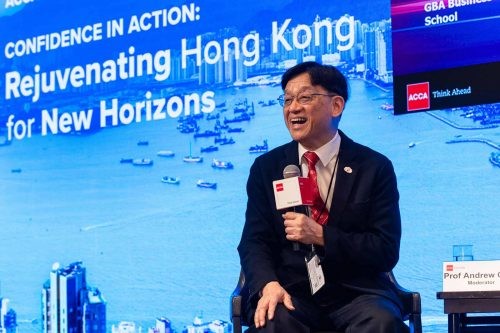
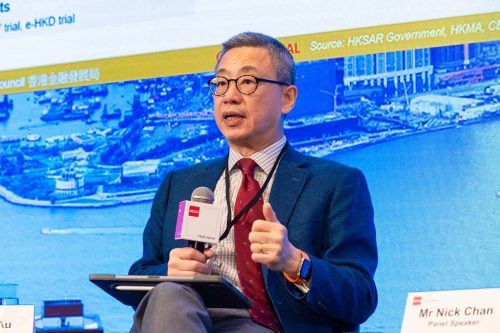
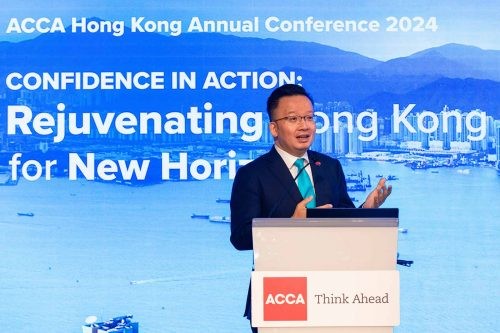
‘We need to leverage the synergies and mutual advantages between our industries,’ said Chan. ‘By fostering partnerships and alliances, we can bolster our resilience in the face of uncertainties down the road.’
Global connectivity
Hong Kong’s status as an international financial centre is more than just a name, said Dr King Au, executive director of Hong Kong’s Financial Services Development Council. He noted that fundraising, family offices, private capital, digital assets and sustainable finance all present massive opportunities, while innovation and technology firms can leverage Hong Kong as an entry point to Asian markets.
Developing high-growth technology industries should also be a top priority going forward, said Nick Chan, director of the AALCO Hong Kong Regional Arbitration Centre. The growing digital economy, advancements in artificial intelligence (AI) and integration of 5G networks present immense opportunities to boost living standards and power continued economic growth, he added: ‘Auditors and accountants can play an important role in helping clients understand how Hong Kong can serve as a springboard into these promising areas.’
Exporting expertise
In the life science field, Hong Kong is the place that birthed ground-breaking non-invasive prenatal testing through a technology that detects inherited diseases like Down’s syndrome using a simple blood sample.
Professor Dennis Lo, associate dean (research), faculty of medicine at The Chinese University of Hong Kong, laid the groundwork for this breakthrough. Lo co-founded Xcelom to commercialise non-invasive prenatal testing, also patenting the technology to industry partners like Illumina and Labcorp.
‘Hong Kong is small in size but has a high concentration of excellent research universities’
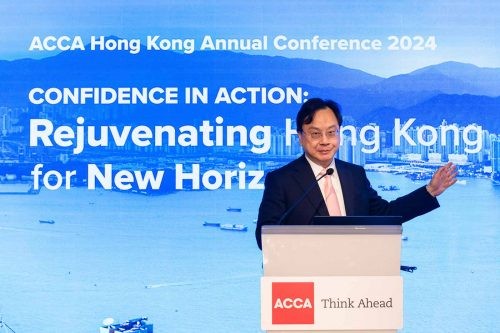
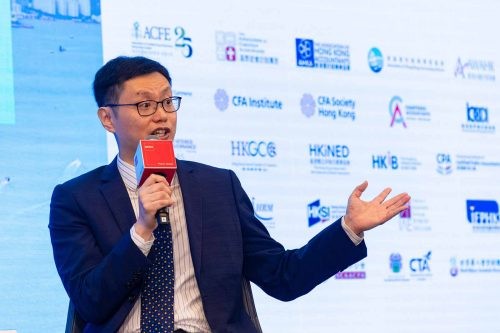
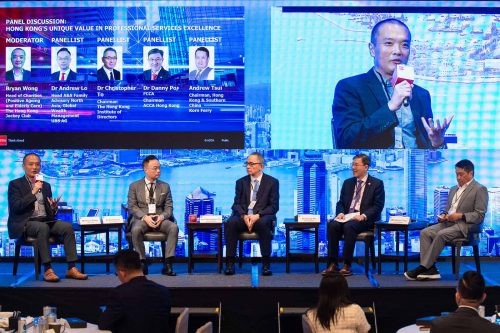
‘Hong Kong is small in size but has a high concentration of excellent research universities that can drive innovation,’ he said. ‘The city has tremendous potential to develop technologies that shift scientific paradigms. We encourage local R&D teams to pursue patents to maximise the returns on their impactful work.’
On the trade front, Hong Kong’s service industry is fuelling the post-pandemic recovery. ‘We’ve successfully exported Hong Kong’s professional services and other services trade – such as certification and design – through our trade events and seen a steady recovery of participation to 80% to 90% of pre-pandemic levels,’ said Dr Patrick Lau, deputy executive director of the Hong Kong Trade Development Council (HKTDC).
Lau described how in connection with its anchor conferences, HKTDC provides value-added services like dealmaking to help enterprises bring investment projects to Hong Kong, find local partners and connect with investors. The council has also promoted Greater Bay Area (GBA) opportunities and organised more than 110 seminars and networking activities attended by over 8,000 participants under the GoGBA initiative. The award-winning GoGBA online app, a one-of-its-kind policy information aggregator, has also achieved impressive results, attaining more than 4.1 million views globally and still fast increasing.
Wealth powerhouse
Although Hong Kong’s finance, legal, education and hi-tech industries have long capitalised on the SAR’s unique position and skilled workforce, 2024 has also brought greater uncertainty.
‘News cycles are overflowing with stories about capital flows shifting away from Hong Kong to Singapore and large professional firms in Greater China facing different challenges,’ said Bryan Wong, head of charities (ageing and elderly care) at The Hong Kong Jockey Club.
‘Accumulated proven knowledge and human judgment are things AI cannot replace’
‘Opportunities can also emerge during turbulent times,’ he noted as he moderated a panel on helping professionals adapt to evolving market dynamics.
Despite facing high interest rates and a global economic slowdown, according to the Boston Consulting Group’s Global Wealth Report 2023, Hong Kong’s wealth management volume grew 8% year-on-year and is projected to surpass Switzerland by 2027, according to Dr Andrew Lo, head of A&S family advisory North Asia, global wealth management, at UBS. While the wealth management industry can embrace AI to automate operational tasks, clients would still value human touch at client interphase. ‘AI is a great productivity tool but it is not a straight substitute for learning new knowledge and human judgment,’ he said.
Waves of change
Meanwhile, Hong Kong’s legal, arbitration and mediation sectors are also flourishing, said Dr Christopher To, chairman of The Hong Kong Institute of Directors. The authority on alternative dispute resolution techniques credited AI with allowing him to ‘quickly sift through information’, which he can then use to support his predominantly financial and accounting clients.
In accounting functions and mergers and acquisitions transactions, Dr Danny Po FCCA, chairman of ACCA Hong Kong, pointed out that robotics and AI can play an instrumental role in helping junior staff support due diligence, but accountants still need ‘strong commercial acumen and communication skills to solve problems’.
Talent trends in flux
Hiring sentiment changes from quarter to quarter as employers adjust to internal and external factors impacting their business, and new businesses arise as outdated ones fade. The good news is that accounting skills are always in demand, said Andrew Tsui, chairman (Hong Kong and Southern China) at Korn Ferry, who stressed the importance of establishing the city as a premier hub for professional services education in fields like engineering, accounting and law.
‘The crux is aligning available talent with the right job opportunities’
Accounting remains a stable, sustainable field given its integrated role across many sectors, Po noted. ‘The crux is aligning available talent with the right job opportunities,’ he said.
To join the workforce of the future, Tsui advocated for continuous self-learning and professional development. To capture emerging opportunities in the GBA cities, he urged professionals to ‘be prepared to take some short-term pay adjustments, and continue improving Mandarin language skills and deepening understanding of workplace culture. Keeping up to date on how things work, including government policy and taxation, as well as the rapid pace of innovation in the GBA, would pay big dividends.’
‘Ultimately, professionals must walk the talk, foster a positive mindset and serve as role models for younger generations as the economy undergoes digital transformation,’ Po concluded.
More information
Watch the ACCA Hong Kong Annual Conference 2024 on demand.
Read our article from the conference: Building Hong Kong’s economic future.
